MODALIS Group was created in 2002 by Bernard MEÏ. With its slogan being « Innovates, Develops, Invests », MODALIS stands out within its market. Historically known for its technical expertise on intermodal equipment, the MODALIS group has progressively designed an entire ecosystem to offer Intermodal logistics solutions and speed up transport decarbonization. MODALIS mostly operates in Europe and as part of its strategic investment plan recently acquired Italian factory C.C.F.C. to expand its European footprint and foster innovation.
The company manages a diversified fleet of swap bodies of more than 4,000 TEUs and will manage a fleet of 1,000 intermodal railcars by 2024. The Group employs one hundred and thirty people in France, Italy and Spain and expects to achieve a turnover of 60 million euros this year covering more than 20 countries.
Easy Engineering: What are the main areas of activity of the company?
MODALIS: We are an intermodal logistics solutions provider focusing on fleet management and related services. The rental and trading of intermodal equipment is the core business. Thanks to a strategy of acquisitions and partnerships, new activities were added to promote and accelerate modal shift such as modal shift advisory services, expertise in energy efficiency certificate which encourages investment in new intermodal equipment, rail-road terminal management, maintenance of intermodal equipment. The Group has been accredited by CERTIFER as Entity in Charge of Maintenance and has provided maintenance services for freight wagons since 2017.
Early 2023, the MODALIS Group acquired the Italian factory CCFC based in Lallio (Bergamo) to manufacture swap bodies, containers, and semi-trailers P400 used in Combined Transport.
In July of the same year, the MODALIS Group acquired the engineering consulting firm ALTECH with the objective of providing new energy and chemical players with innovative intermodal transport and mobile storage solutions. Also, ALTECH can provide project feasibility studies (technical, permitting, etc.) for petrochemical industries and Engineering, Procurement and Construction Management (“EPCM”) services, such as truck loading station, H2 refuelling station, railway loading station, Newtonian fluids terminal and related infrastructures.
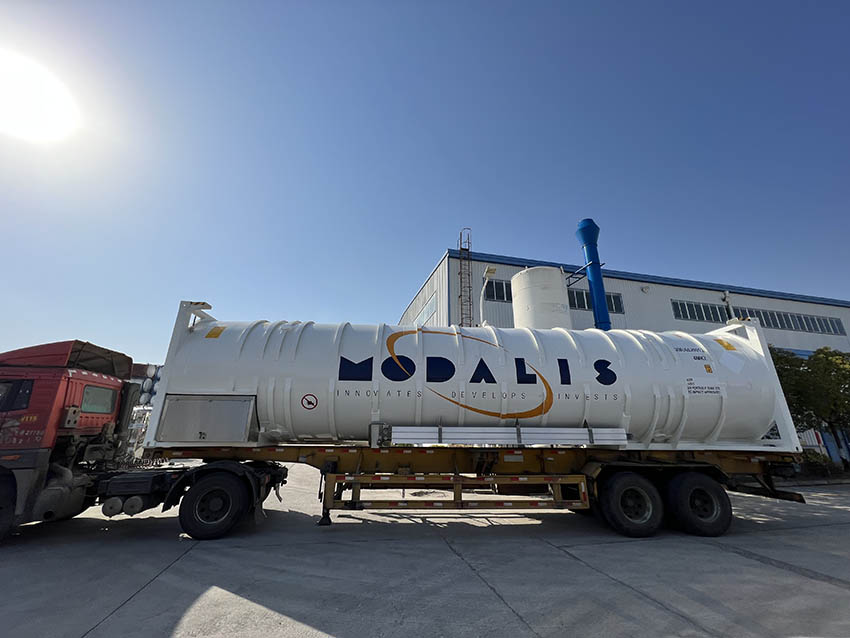
MODALIS actively pursues a strategy of acquisitions and partnerships to promote and accelerate modal shift by combining capabilities and capitalizing on synergies and complementary strengths.
E.E: What’s the news about new products?
MODALIS: The fleet of intermodal equipment is the heart of MODALIS’ organization. Each family of equipment has been optimized on a continuously basis since 2002. A selection of brand new innovative items has been introduced during Munich Transport Logistics exhibition in May 2023, notably the fastest intermodal transport wagon in Europe! A 92ft freight wagon designed to transport containers at a speed of 140 km per hour. It took several years of collaboration with the Slovak manufacturer TATRAVAGÓNKA to design and obtain the approval for the Sggmrss 92′ wagon.
Complying with the Technical Specifications for Interoperability* (“TSI”), its innovative ergonomic dimensioning (92 ft) allows for the transportation of a wide variety of loads, such as the loading of two 13.60 m (45 ft) refrigerated swap bodies, in all positions, and limits damage during vertical handling operations. Its other noteworthy features include: three silent bogies (a dual-axle trolley) reducing traction efforts, operation which is more respectful of the tracks thanks to improved radial steering, a lighter weight (with a tare of 28.5t vs 29.5t for a 90′) making it possible to optimize the payload, and a powerful braking system with disc brakes (comparable to passenger carriages).
MODALIS also introduced during Munich exhibition, robust P400 semi-trailers made for Maghreb hard road conditions, modular swap body coil-carriers, swap body open-top with automatic hard covers. More to come in 2024 such as a lightweight curtain side 45ft swap body to be introduced in 2024.
Eventually, MODALIS designed innovative package in combining Energy Efficiency Certificate with long term (min. 36 months) rental offers. MODALIS is eligible for introducing EEC file to French authorities and have its customers benefiting from this incentive in return. As the process and technicalities are complex and in French only, dealing with one trustworthy partner throughout the process is a competitive advantage.
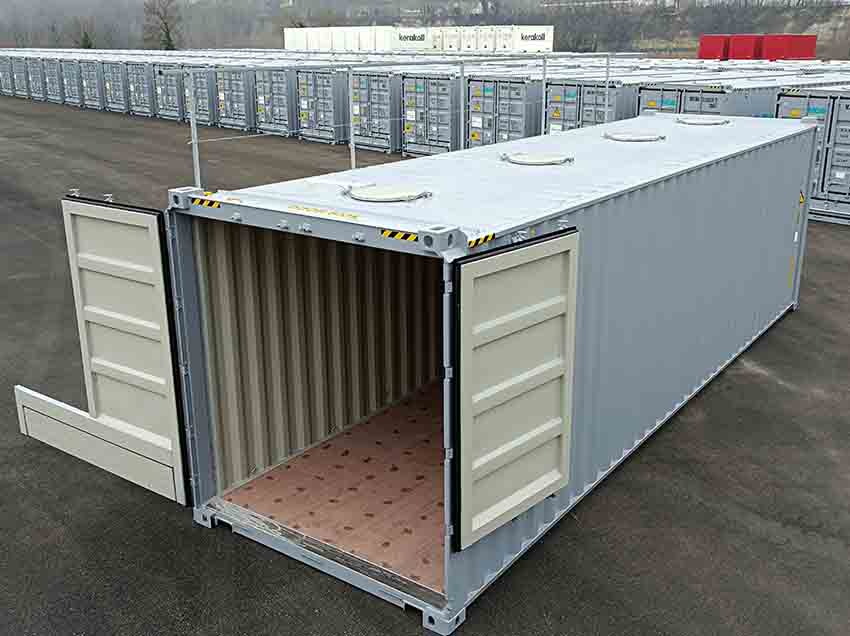
E.E: What are the ranges of products?
MODALIS: MODALIS has probably one of the largest ranges of intermodal equipment in Europe, that covers the very various sorts of cargo managed by carriers and logistics companies:
- GENERAL CARGO (Curtainsided, box and reefer swap bodies)
- DRY BULK CONTAINERS (Bulk box and Silo containers)
- GAS TANK CONTAINERS (Pressure, Cryogenic tank containers)
- LIQUID TANK CONTAINERS (Chemicals, foodstuff)
- CHASSIS (Tipping, skeletal)
- INTERMODAL rail cars (40ft, 60ft, 80ft – 3 bogies, 80ft – 4 bogies, 90ft, double-pocket wagons T3000, 92ft approved for 140km/h)
- SPECIFIC AND TAILOR-MADE SWAP BODIES AND EQUIPMENT
MODALIS ensures maximum payload, robustness, usability and safety while securing the goods being transported or stored. The MODALIS Group always welcomes new demands and innovates to supply each client with exactly what he needs.
E.E: At what stage is the market where you are currently active?
MODALIS: Climate change is every day more visible. IPCC reports human activities, principally through emissions of greenhouse gases related to transportation have unequivocally caused global warming! Environmental matters have popped up at every level from board members to the new generations. Intermodal transportation has resurfaced as an immediate and viable solution. Railcars market has been extremely active over the last 3 years with financial mergers, acquisitions, and related restructuring such as ERMEWA, WASCOSA, VTG. Investing in railcar industry and wagons is an alternative to investing in infrastructures or real estate markets.
Still major obstacles keep slowing down the modal shift. The lack of intermodal terminal in Europe, the renovation of railway infrastructure causing delays and frustrations. With that being said, the trend towards modal shift has clearly been engaged. The urgency placed on the decarbonization of transport tends to help the development of this industry on the long run. The European Union supports its growth by allowing a large budget to many intermodal projects. These financial subsidies, as hard they are to get, are a great help for our industry even if they’re not enough compared to the modal report uptake. To sum up, intermodal transport is still at a transition stage, very dynamic and full of opportunities. By focusing on innovation, MODALIS places itself as a strong leader in this niche market.
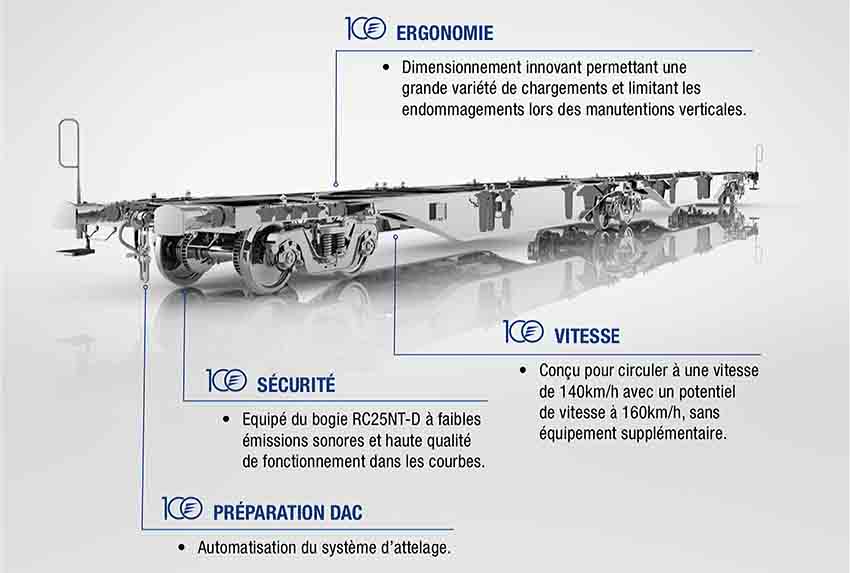
E.E: What can you tell us about market trends?
MODALIS: The market situation is currently impacted by several factors such as the long-term fossil fuel crisis resulting from the geopolitical situation. This crisis equally impacts the chemical industry which is directly linked to energy costs and a highly constrained supply chain. Even with these tough circumstances, the global concern over CO2 emissions and more generally the pollution coming from the transportation industry hints towards a significant growth of modal shift. UIRR (International Union for Road-Rail combined transport) is forecasting a strong underlying growth, slowed by this crisis but clearly set to pick up again because of the growing environmental constraints imposed by the EU.
Raw materials inflation and Ukraine war had also deep impact causing intermodal equipment price to increase by 25%-30% last year. Price has started to decrease and hopefully this shall not discourage the renewal of equipment fleet that is a must in Europe. According to experts, the investment needs for intermodal wagons are approximatively € 12 billion until 2050 (Source: Zero-Carbon Combined Transport Study – UIRR).
E.E: What are the most innovative products marketed?
MODALIS: MODALIS places innovation at the core of its activities. Our equipment (swap bodies or railcars) is standard or custom-made depending on our clients’ needs. This commitment to improvement drives us to invest each year in prototypes and new projects. The integration of CCFC and ALTECH to the MODALIS Group shall significantly speed up delivering innovation.
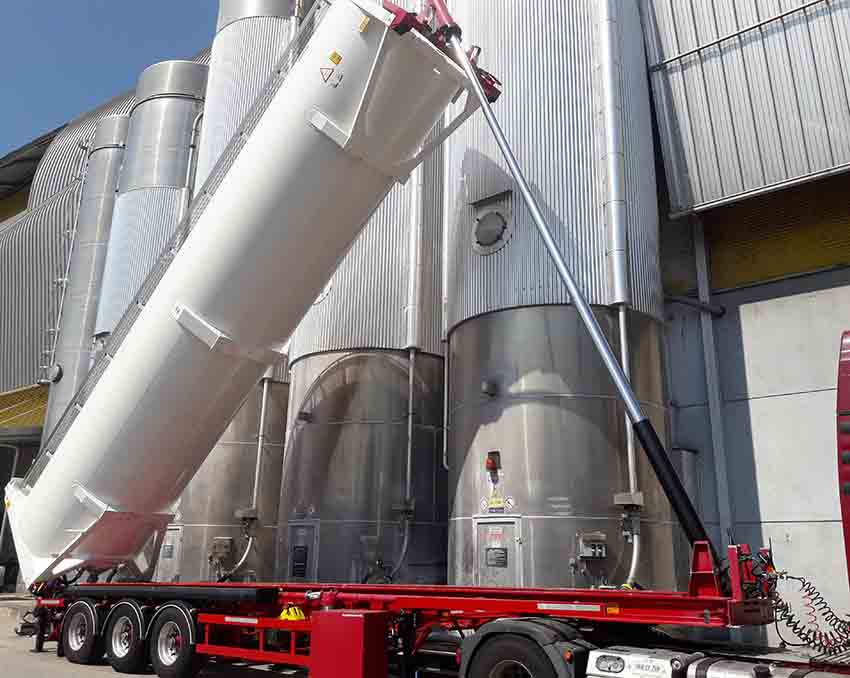
As part of the most innovative products currently marketed, in addition to the 140km freight wagon above mentioned, we are currently operating tests on our open-top bulk swap-body. This container is equipped with an automated hydraulic open-top system. The already existing solutions work with tarpaulins or hard top which are not optimal in terms of security, reliability and operability. This new solution is now patented by MODALIS and shall provide our clients with a faster and easier option.
MODALIS’ team is also engaged on a project of container equipped with a horizontal movement drawer system for emptying bulk or waste, offering an alternative to moving floor which are reported to be fragile and suffer from expensive maintenance with certain types of cargo. Intellectual property for that project have also been protected.
Our new LNG tanks prototypes, which are currently undergoing tests, are also set to be an efficient improvement for the energy industry willing to decarbonize their logistics chain. This innovation will provide our clients with an optimized loading capacity, up to 5% larger than the standard LNG tanks. The thermic isolation was also improved, making their possible using time longer. Moreover, our new LNG tanks’ piping is more accessible, easily fixable and unloading time was reduced.
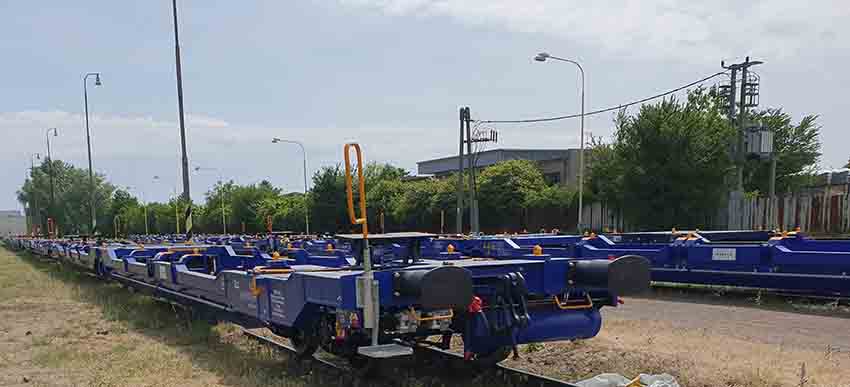
E.E: What estimations do you have for 2023?
MODALIS: First semester of 2023 was disappointing, the soft landing with inflation coming down and growth steady did not happen. Inflation and price pressure remain high despite the rise in interest rates. Modalis as a rental player has observed it very early, dealing with wait-and-see customers.
Policymakers have now new challenges: the stakes are high, and the pressure is overwhelming due to a pronounced growth slowdown. It appears that increasing economic nationalism and geopolitical tensions has led governments seeking to advance their national interest.
As far as MODALIS is concerned, we hope this period will generate the creation of a coherent European rail transport policy focusing on long-term considerations, promoting efficiently combined transport at Europe level, tackling disguised discrimination among European countries, and fostering interoperability. The European Year of Rail (2021) shall be prolonged over the decade to deeply slowdown climate change.

